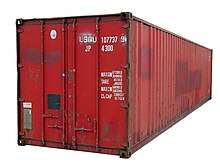World Shipping Council
The World Shipping Council (WSC) is the peak industry trade group representing the international liner shipping industry, which offers regularly scheduled service on fixed schedules. Most liner carriers are container shipping lines. The WSC is headquartered in Washington, D.C. and is led by Chief Executive Chief Executive John W. Butler, former general council for the WSC and former President of the Maritime Administrative Bar Association.[1]
Membership
Council membership includes the world's ten largest container shipping companies[2] as well as smaller firms collectively comprising 90 percent of global container shipments.[3]
In December 2014, it was announced that Christopher Koch, formerly the General Counsel for Sea-Land Service Incorporated and Chief of Staff for U.S.Senator John McCain and former Senator Slade Gorton would retire as President and CEO in July 2015, with Senior Vice-President and General Counsel, John Butler, assuming the position.[4]
Activities
The Council was formed in 2000[5] to lobby national governments regarding container and cargo shipping regulation, generally in favour of improved maritime security coupled with deregulation of ports and transport routes.[5][6] The Council also develops draft standards on vessel air emissions and pollution, improvements to seaport customs procedures and international standards for container design and handling.
In 2007, in response to continued problems with containers lost overboard during heavy seas, the WSC and the International Chamber of Shipping began work on a code of practice for container storage, including crew training on parametric rolling, safer stacking and marking of containers and the securing of above-deck cargo.[7]
References
- http://www.worldshipping.org/
- "Alphaliner Top 100". Alphaliner. June 2018.
- "Member Companies". World Shipping Council. 2018. Retrieved 2018-06-14.
- http://www.hellenicshippingnews.com/world-shipping-council-announces-leadership-transition/
- "Remarks before the Maritime Association of the Port of New York and New Jersey". World Shipping Council. October 2000. Archived from the original on 2007-08-22. Retrieved 2008-02-15.
- "About the Council". World Shipping Council. 2018. Retrieved 2018-06-14.
- "Banana box slip a worry". Lloyd's List Daily Commercial News. Informa Australia. 2008-02-07. Retrieved 2008-02-14.
